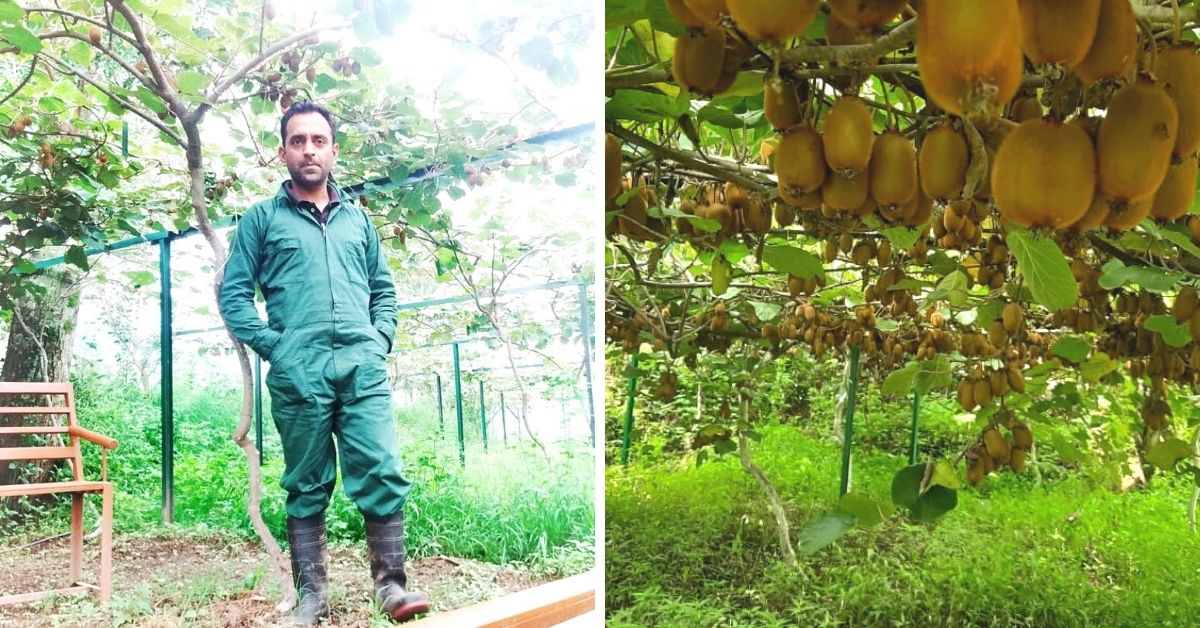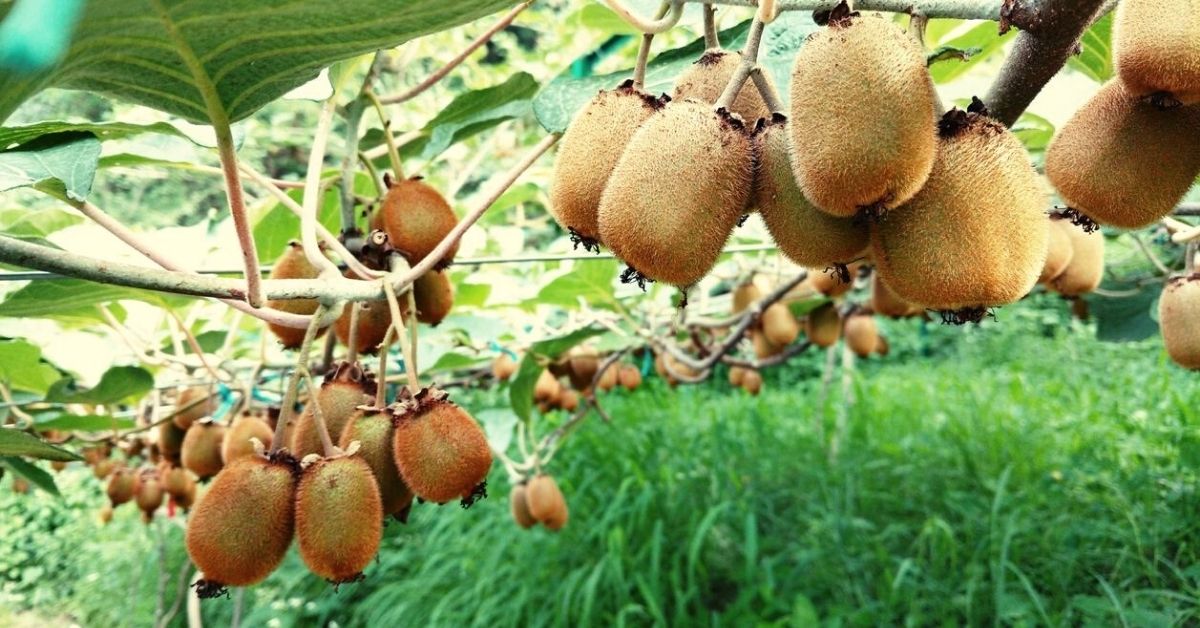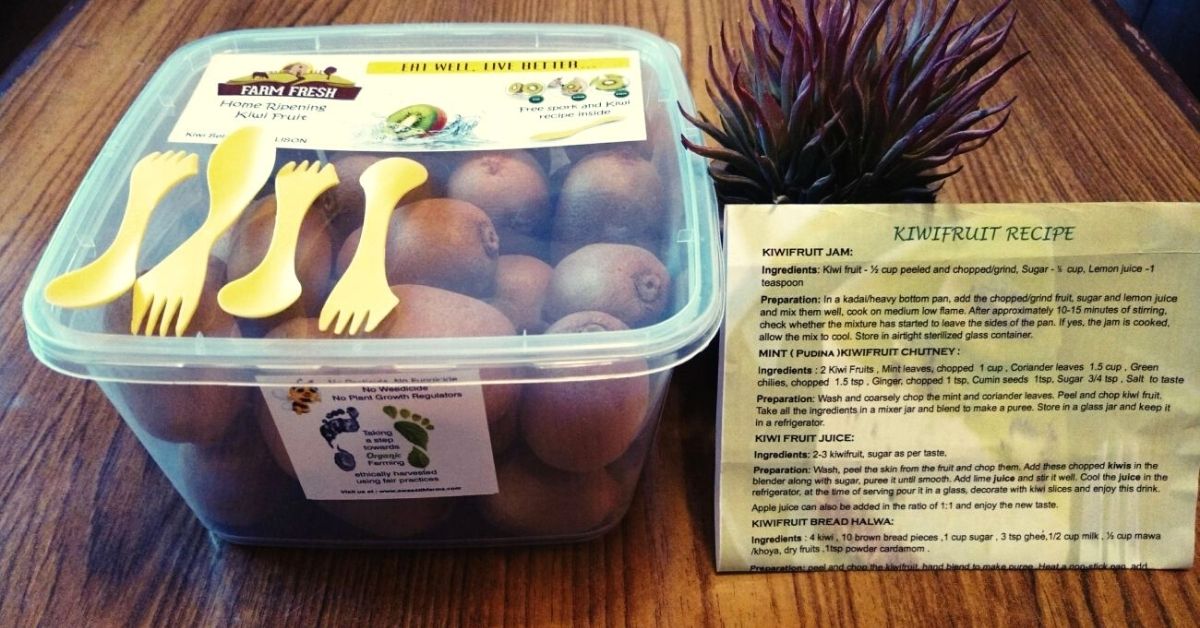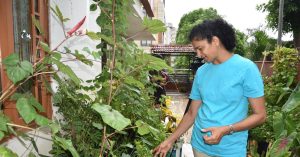Techie-Turned Organic Farmer Converts Barren Land into Fruit Farm, Earns Rs 40 Lakh a Year
Mandeep Verma quit his job to launch Swaastik Farms, an organic fruit farm that sells kiwis and apples, selling fresh produce across India

Nestled in the foothills of the Himalayas, a 5-acre farm in Shilli village is home to an abundance of delicious kiwis and apples, hanging from their plants, ripe for the plucking.
After harvesting, these fruits are taken to customers directly, without the interference of artificial and chemical components.
“The fruits have no insecticides, pesticides, weedicides, fungicides, or any plant growth regulators. All you have to do before eating is rub them with a gentle cloth, and you’re good to go,” says Mandeep Verma, founder of Swaastik Farms, which produces fruits through natural farming methods.
Today, he is reaping as much as Rs 40 lakh from his organic paradise. But before he quit his job for good, he was leading the regular corporate life in Delhi.
“I completed my MBA in 2010 and pursued a career in business marketing. My IT job involved me handling about eight clients, which gave me exposure to deal with higher officials in the government and network with a range of professionals in the field,” he tells The Better India.
Success from a barren land

But after working in the sector for four-and-a-half years, Mandeep wished to return to his roots, more particularly, his hometown in the Solan district.
“I wasn’t satisfied with my job, and my career growth was not as expected either. I decided to quit, wanting to establish an entity that I could build from scratch. But I did not know what alternative career to take — I’d always been told that completing your education meant bagging a traditional job. I spent time researching and decided to have a different outlook towards the academic skills that I possessed,” he says.
The 38-year-old then decided to pursue farming. “I discussed my thoughts of quitting my job and taking up farming with my wife, who agreed to support me. We had 4.84 acres of unused ancestral land in Shilli, and decided to use it for our purpose,” he says.
But with knowledge in only marketing and no experience in farming, Mandeep was unaware of how to grow vegetables, or any crop for that matter. Moreover, the land was barren and had never been used for farming activities.
“There had been no human intervention on the land, and the fertility of the soil was unknown. The land was occupied by weeds, grasses and other wild vegetation. I believe that nature always inherits nutrients such as foliage, organic matter, decomposed animals and others. The Himalayan soil is rich in nutrients, and I decided to put faith in it by not using any chemicals for farming,” he says.
Another problem was that his land was on a slope and uneven. Mandeep then removed the wild vegetation and levelled the soil. “It took plenty of time and effort to bring the land up to the mark for cultivation,” he says.
Mandeep then decided to use the internet to learn about farming and watched hundreds of videos. “I learned about various aspects required to grow food using organic and natural farming methods,” he says, adding that he referred to agricultural journals, and also took guidance from the local authorities and experts working at the horticulture department.
The entire process took about five months of groundwork, he says.

The process helped Mandeep learn that the farmers in neighbouring areas were troubled with the monkey menace. “The monkeys scraped through the farms consuming the fruits and damaging the harvest. Considering the issues, I decided to find a safer crop to grow,” he says.
He approached a few professors at the Himachal Pradesh Agriculture University, who suggested he grow kiwis. “A few farmers living about 30 km away were cultivating the fruit. Realising that it could be a feasible prospect, I decided to take the guidance of professors,” he says.
“Kiwi is sour during its initial fruiting days, and the hair-like surface deters monkeys from touching the fruit. It also fetches good market value for being a niche and exotic fruit. I purchased 150 kiwi plants of Alicene and Hayward varieties and started growing them on a small patch of land,” he explains.
Mandeep then used jeevamrut, a mixture of cow dung, cow urine, jaggery, gram flour and other organic material to add nutrients to the soil. “I also introduced sapta dhanyankur, a mix of seven grains including black-eyed pea, wheat, horse gram, black gram, green moong dal, sesame seeds and chana in equal proportions. The mixture is soaked overnight and then drained out for sprouting. A paste is prepared from the grains and mixed with water and cow urine. The solution is filtered after a couple of hours and stored,” he notes.
The liquid mixture is sprayed during the flowering and milking stage of the plants. He sprays fermented buttermilk on plants to prevent any pests from attacking the crops on the farm.
Mandeep received his first harvest in 2016. “I offered my farm produce in the local market at Rs 350 a kilo and received desired appreciation. In 2017, I launched the business under the name Swaastik farms and floated a website,” he says.
The website helped him cater to customers across Uttarakhand, Chandigarh, Haryana, Punjab, Delhi, Hyderabad and Bengaluru, he says.
After succeeding in growing kiwi, Mandeep invested in developing an apple orchard. “In 2018, I opted to grow Italian varieties of apple that have short height and bear fruits in a year,” he says.
Mandeep says he has also created two nurseries with 12,000 saplings that he uses to propagate and sell for profits.
‘Improve the image of a farmer’
Mandeep says he invested Rs 14 lakh in his farm and now has 700 kiwi plants producing 9 tonnes of fruits. Additionally, he has 1,200 apple trees. The total enterprise generates a revenue of Rs 40 lakh a year, he says. “I expect the kiwi production to increase up to 45 tonnes in coming years,” he adds.

Deepak Mehta, a Solan-based entrepreneur and frequent customer, says, “I have been buying kiwi and apples from Mandeep for four years now. The fruits are bought for personal consumption and shared as gifts between friends and relatives.”
Deepak says the organic fruit from Mandeep’s farm stands out in multiple ways compared with others in the market. “The fruits taste sweeter and better compared with others found in the market. They are fresh and last almost two to three months, whereas the others bought from the market do not last for more than ten days. My family does not prefer any other products apart from these organic ones,” he adds.
Mandeep initially struggled to source and propagate quality seedlings. “I researched a lot to find quality planting materials and saplings. Slowly, I gained access to them, which delivered better harvest and results,” he says.
He further admits that he took an immense risk by switching professions. “There were significant risks, and I was worried I wouldn’t achieve success after quitting my stable corporate life. My parents have been supportive throughout my journey, but friends and relatives were sceptical about my move,” he says.
He adds that many of his friends considered farming an inferior profession or a menial job. “I feel that the society’s notion towards a farmer should change for the better, as it is a noble occupation,” Mandeep says.
Edited by Divya Sethu
If you found our stories insightful, informative, or even just enjoyable, we invite you to consider making a voluntary payment to support the work we do at The Better India. Your contribution helps us continue producing quality content that educates, inspires, and drives positive change.
Choose one of the payment options below for your contribution-
By paying for the stories you value, you directly contribute to sustaining our efforts focused on making a difference in the world. Together, let's ensure that impactful stories continue to be told and shared, enriching lives and communities alike.
Thank you for your support. Here are some frequently asked questions you might find helpful to know why you are contributing?


This story made me
-
97
-
121
-
89
-
167














